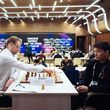Yasser Seirawan: If Anything Sounds Like Work, I’m Looking for an Exit
A famous grandmaster and commentator gave an interview to Mark Gluhovsky after the WR Chess Masters event in Düsseldorf.
- Yasser, you stopped your player’s career some years ago, but now you’re a famous commentator. Can you compare the first and second parts of this job – player and commentator?
- First of all, there’s no question in my mind today that commentating is so much easier than being a player. When you’re a player, you feel great pressure on yourself: “I want to win the tournament.” And, well, the only way to win the tournament is to beat your rivals, right? So, now, before the tournament, you prepare for your games. You try to find the novelty, you try to come in a good sporting condition, a proper mindset, and you’re determined. You hope you’re healthy. You play the tournament, and then, during it, you’re not necessarily studying or preparing, but you’re looking carefully at everybody’s games. What did they do? What new ideas did they introduce? You don’t want to be surprised by any of their ideas, so you have to follow all the games at the tournament. And then you have to be in your mind’s eye: “I’m competing against him or her, and then, because of the competitor’s situation, I have to win with Black.” Like Nepo, who was in a forced winning situation with Black, so he had to be in this mindset, to be determined to play a long game. This is really, really hard work.
Commentating? “Yasser, would you please come down in the afternoon, when the game is beginning…” Let’s imagine I wasn’t a commentator. What would I be doing? Of course, my window would be open, and I would have the games on my screen. Of course, I would have a computer in the background. Of course, I would listen to Peter Svidler, going “Bz-z-z-z!” (laughs) and getting all the variations, and just check with a computer, “Yep, Peter’s right, yep, Peter’s right, yep, Peter’s right” (laughs). So, here, what I do as a commentator… I feel like I got a front-row seat. First of all, I don’t know why but they say, “Yasser, you’re a VIP!” Really? (laughs) So I have a front-row seat, I get to talk to the players, I get to watch the games, and if I wasn’t here, I’d be watching the games anyway, so for me this is great! I’m being paid to give my commentary, and I’m not like Peter. Peter… I’m not sure if Peter works harder as a player than as a commentator because he’s giving such variations! I don’t think my audience is going to appreciate it if I “Br-r-r!”, because for them it’s work. They want to be told, “Magnus is in a slightly better position because his strategy is long-term, and his strategy will be to take over on this square.” And I think Magnus is better, but clearly, my audience is like me, they’re looking at computer programmes: Magnus +1.3, okay, he is much better. The computer is not saying that the square b6 is the problem, it is just saying “+1.6”, and here are the variations to support the computer’s assessment. I’m saying, “I like Magnus’s position because of the b6 square.” So I think this combination of the human mind telling you, “You know, if I was in Hikaru’s position, I’d be frightened, I wouldn’t want to allow it.” Computer says, “Nah, don’t worry, I have the defence.” So I think that is attractive for the audience.
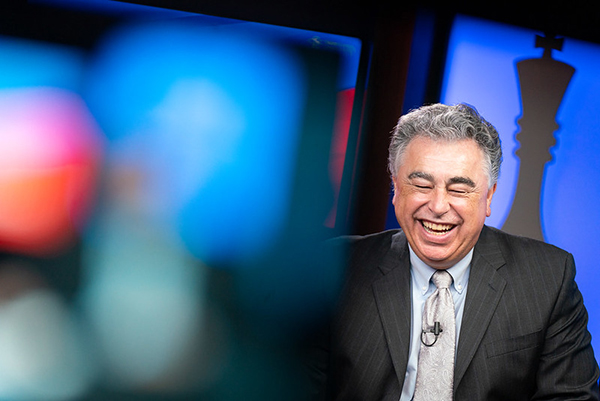
- So, do you prefer working without computers, or sometimes looking at the computer during the commentary?
- No, I don’t look at the computer, full stop. The one time I violated this rule, and I’m so happy I did it… It was a round in Wijk aan Zee. Anish Giri is the local hero, and he plays a queen ending with Wesley So. Anish is a pawn up. So, a thousand people in the audience are watching and rooting for him. It’s been already six hours of commentating, and we have this crazy position. I said to the audience, “I apologise. This queen ending is all calculation, yeah? I’m going to turn on the computer.” I turn on the computer, and it’s instantly +47. Anish is winning by 47 pawns (laughs). Of course, I can’t understand why it’s 47, why not 42? Anish makes a move, and it’s instantly 0.00. And I can’t even understand why it’s zero! Wesley makes a move, and it’s instantly +47! And it went back and forth like this for, like, eight moves in a row. The reason was 20 moves later. So, there are many positions in chess in which the computer is just absolutely, absolutely necessary, like a table base. I can look and say, “I’m pretty sure this is winning, the table base says it’s mate in 37.” You know, I have this great story. I’m playing in this tournament “Man vs Machine”. It was a wonderful tournament in the late ‘80s – mid-‘90s. We had these computers from all over the world. The weak computers you play with a board, and supercomputers from the University of Princeton - the Komodos, and MChess, the Fritzes, and the world champions, and stuff like that. And I was watching my friend Cifuentes playing a game. He’s a pawn down in a rook ending. After a few minutes, he plays the right move, and the operator says, “I’m sorry, mate in 47.” Checkmate in forty-seven (laughs)! He looks at me and starts laughing. I said, “I don’t believe. It’s just intimidating tactics.”
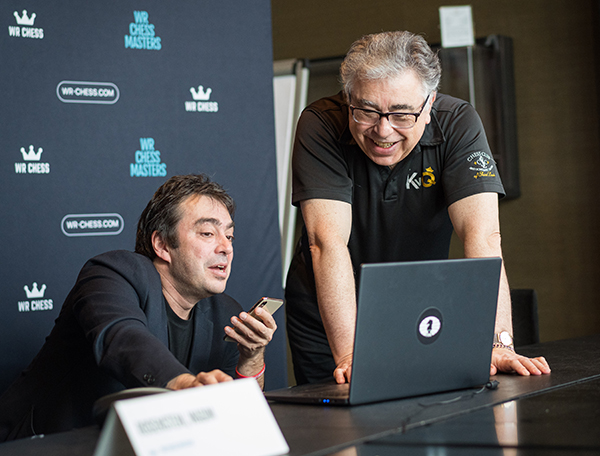
- That’s funny, but there’s a story that some amateur told, I think, to Tolush, “I will mate you in four moves.” “Please do it” (Both laugh). But you can’t say to a computer, “Please do it.”
- I will resign immediately because the problem is that the computer will say “Mate in 47”, but every time I make a move, it would say, “Oh, now it’s mate in 37.” Then it’s 28. It gets worse and worse!
- It’s like this card game I like, Preferans. The players don’t play, they just open their cards and say, “Okay. This is plus one, or minus one,” without playing.
- Exactly.
- Okay. So, are you happy with your new job, as a commentator?
- Yes. First of all, that was the thing: when I retired in 2003, I was 43 years old, and for me, at that exact moment, 2003, if you go back in your mind, chess was in a terrible, terrible crisis.
Vladimir Kramnik was the new world champion, and he played against Peter Leko, but it wasn’t even clear that Kramnik had any cycle so that people could challenge him. Garry Kasparov was the world’s highest-rated player, and he was not in the FIDE, and he was not in Kramnik’s cycle. The FIDE had a knockout champion, his name was Ponomariov, and it was like the knockout champion had one incredible event, but this was just one event in the year, so if there was any event that you wanted to win in a year, it was the knockout. And that was the official World Championship of the FIDE. The sponsors were in a crisis. Which champion do they recognise – Ponomariov (official), Vladimir Kramnik (unofficial) or Garry Kasparov? So, the sponsors were leaving chess. For me, exactly at the time when I left the chess world, it was a terrible moment, and I was seeking a resolution. I wanted to make a unification. Today, it feels like a golden period, because, strangely enough, after Dubai, nobody will say anything. We have a world champion, his name is Magnus Carlsen, we all recognise him. Now Magnus abdicated, and we will have a new world champion in April. And we have rapid and blitz championships, we have open tournaments, we have online chess, we have commentaries, we have chess books, chess magazines… It’s a fantastic, fantastic period! And we have no events like this one.
- We also have the senior tournaments.
- Yes, the Senior Championships.
- Do you want to play in them? Are you thinking about joining a tournament?
- Not at all, not at all. Because, first of all, I feel… Let’s imagine, Wadim Rosenstein, the organiser of the WR Chess Masters tournament in Düsseldorf, has lost his mind and invited me to compete. Wow! Gukesh, Pragg… How do I prepare for these guys? Suddenly I’m thrown into a crisis, and I should really work very hard, suddenly improve all my openings, do some training, and… Very excitedly, I start my work to justify his invitation and faith in me, to prove that he made the right decision in inviting me to play in this tournament. I have this idea that I have an obligation not only to myself but to the organiser to play well and to work really hard. This workload that these players have to do, it’s so terrible, what they do is so… They really need help. And if you’re not working with one or even two or more coaches, the workload is overwhelming, just to remember all of your files… Look, I’m not interested in it, I can’t motivate myself to do the work that I know is necessary. So I don’t think about it at all. I love it when children or people come to me and say, “You know, I work really hard, I took your advice and I did something, and it paid off…” Glad you could do it! (laughs)

- But I should say that your commentaries are also… You told me about Svidler, okay, Svidler is unique…
- Unique! In every way.
- But you also show all variations very quickly and on time. You’re still in good chess form, it’s not just “Okay, it’s a weak square…” The arrows, which you use, usually show what happens on the board. It was the reason why I asked you if you wanted to play. But I understand that it’s a really boring time before the tournament.
- Oh yes, it's hard work. And also, the other thing is, keep in mind that what I’m doing in my commentary and I’m saying, “I really like that Levon has developed in this nice way, and I think that if he plays b5, Rb8, and Bb7, he’s attacking on the queenside in the way that is very hard to stop. Bravo!” And it works. There’s no pressure on me. His clock is ticking, and if he finds some other idea, it’s because under the pressure of the ticking clock, he’s not looking with clear eyes. So my perspective is a little bit unprejudiced. I don’t have the pressure of the players, and trust me, you know, that ticking clock is so different from commentary! (laughs) We also say that the spectator sees everything, right? Because there’s no pressure. The next thing, a very important one for the commentator, is as follows: if I’m wrong, I don’t lose the game! So, that’s the other thing. I feel that there’s no pressure on me. In fact, it’s the opposite. I think it’s enjoyable, I’m commentating with a smile, because “This reminds me of an old game I used to play”, it’s nice. I think I told the story on the broadcast that chess is a young man’s game, yeah? And when I was young, I was playing in a tournament in California, and we were blitzing and analysing together with all these young fighters, my rivals in the Junior Championship. And an old man interfered with our analyses, the hand came down, grabbed the piece and moved the piece. We all turned and looked, “Who is that guy?” The guy was good. This happened several times, and then this old man laughed, and everybody said, “Well, who was it?” None of us knew: it was Max Euwe (laughs).
- So, how many tournaments do you commentate in a year? About ten, or something?
- I try to keep the number much lower than that. So, I do the Grand Chess Tour. This is a fantastic tournament. For example, now we are taking in Düsseldorf. Last year, I did, for example, the Candidates Tournament but I didn’t come to Madrid, I did it from afar. For me, the Candidates and the World Championship matches are super, super, super special. These are great events. But I like very much the Grand Chess Tour, I like these top elite events like this one, WR Chess Masters. So, more or less I commentate on seven to eight tournaments a year. I try to keep it small.
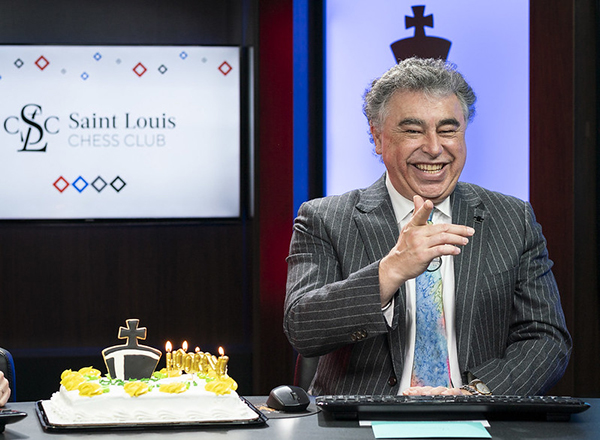
- And usually, the organisers of the tournament invite you as a commentator.
- Yes, that’s right.
- Now, lots of grandmasters make streams, like Hikaru, and ask for donations. This is a different financial model. Have you tried something like that?
- No, I haven't. I had thought about streaming until I read what streamers had to do. If you read about a streamer's life and how much work they put in, you will see that they’re almost completely dedicated to their job. They work like slaves for 2–3 years, and then they literally quit because they burn out. They’re working eight, ten, twelve hours a day!
- Yes, it’s hard work.
- So, for me, if anything sounds like work, I’m looking for an exit (laughs). But I have a lot of friends who stream. You mentioned Hikaru, I’ll mention the Chessbrahs (Aman and Eric). Sometimes I join them on the stream. Ben Finegold is also nice, I enjoy his streams very much. And so, I want to help them and support them by being a guest of horror (laughs).
- Hikaru is especially impressive. He’s working hard every day, but when he played in the Candidates...
- Yes!
- …and after the 7-hour games, he…
- …he’s on the stream explaining what happened!
- But maybe this was the reason why he’s not playing the match right now.
- That is my criticism as well. I want to say that Caissa is a jealous mistress. And when you are playing in the Candidates Tournament, I’m sorry to say that you don’t have a right to think about anything else except winning it. If you tell me that you’re playing in the Candidates Tournament to get subscribers to your channel, we’re on the wrong page together. I am not your coach, I am not your trainer… That is shocking for me – that Hikaru is so successful both as a player and as a streamer. I can imagine that he’s genius enough to do two things.
- I have several questions about the WR Chess Masters tournament. It was a long event, every day we had six or seven hours of chess, so do you think anything new about the players, maybe about those whom you didn’t know very well? What do you think about the concept of the tournament, the young players? How did it look?
- I am sad to say that my view of the tournament – it’s very fresh – is incredibly favourable. The problem is everything about this event, the production of the show, went really well. We had some challenges with the Internet, and the electricity, which we didn’t imagine would be a problem, but the show went really well, and the players were incredibly cooperative during the whole event. We had so many good arbiters that there was nothing to complain about. I will complain because I didn’t get to complain! (laughs) At this moment, everything is very favourable. I've always loved the round-robin system as it’s the most competitive one. Not the knockout, but the round-robin – everybody gets a chance to play against everybody. Before the tournament, I said that I’m a fan of Levon Aronian. Why? Because he’s the oldest man in the tournament! I root for the old guy to get the juniors. And Levon wound up winning the tie-breaker. But what a final! My God, it was so great! Nepo won on demand, which is the hardest thing at the top level. It’s so hard to win a game, but winning on demand with the black pieces?
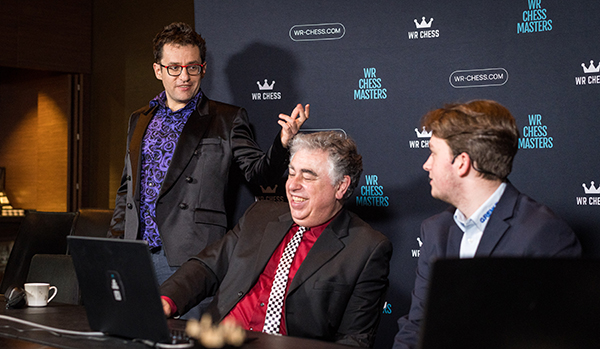
- Especially against Vincent Keymer, who plays very well as White.
- For me, this was like climbing Everest. And Nepo achieved this! It was very funny that Nepo tied for first place... with the black pieces! He couldn’t win with the white pieces but won two games as Black, undefeated. It was a marvellous performance. But Nepo also didn’t appreciate what he’d achieved. For him, he wanted tie-breaks to be played the next day so that he could recover. I understand he was tired. But, you know, the regulations are very clear. Before the tournament, everybody agreed on it. So, as for me, he didn’t play his normal confident self because he wanted to play the next day. And so he spoiled himself his incredible achievement.
Gukesh was quite the revelation for me. He played wonderfully, creatively, and hard.
- And he worked hard every day.
- Every day, yes! You could feel it! You sit down after the game, and he explains to you what he was thinking, and how he was calculating. He’s very accurate. He saved a very difficult ending against Anish. Many grandmasters would have lost it to Anish but somehow he saved it, and that inspired him to go undefeated with a +2 score. So, for me, Gukesh was amazing. Sorry to say, but I kind of expected more from Duda. I have seen him come up, and I have a high opinion of him. But he didn’t show his class. I don’t know why he was obstructed but he didn’t get to show his best.
- Like at the FIDE World Cup.
- Indeed! He had excellent preparation. He eliminated Karjakin on preparation, and Magnus on preparation, but now…
Wesley could have very easily been at the top, but a very unexpected loss in the penultimate round against Vincent with the white pieces (Wesley is tough as White) spoiled his event, which could have easily been a little bit different.
But I want to save my final words of praise for our winner, Levon! He fell over the finish line (laughs). He was doing brilliantly, he was +3 before the last three rounds, and everything went well. But everything went terribly in the last three rounds, and he fell across the finish line. He was tied for first. But, my God, didn’t he play well on the tie-break? He pulled himself together and played the three most excellent blitz tie-break games I've ever seen! Especially the last one. So I was like, “Yes, I chose the winner from the start!” And there you go.
So, hat tip to the organisers, many thanks to Wadim for holding and sponsoring a beautiful tournament, and to the players for their cooperation and for their great games. Seriously, I saw many tournaments that didn’t have as many fighting games as this one, with many more players in them. And I felt that the quality was very high too.

- I remember when Levon made a draw in the last round, I thought, “Well, maybe that’s the first ‘grandmaster draw’ in the whole tournament.”
- Right!
- Yasser, the last question is about your stories. I can remember only one person in the chess world who knows as many stories as you, I mean Genna Sosonko who remembers a new story every half an hour! And you too. So, maybe it’s time to write a book with the stories?
- Mark, you’re absolutely right. The stories I know, like this verbal history of chess, delivered to me by Bent Larsen, and stories of many great grandmasters I know from the past – Svetozar Gligoric, Ljubomir Ljubojevic – I know these players incredibly well. And for me, I was growing up with the hero of Bobby Fischer. So, as a kid, every story, and every rumour that came inside my head about Bobby Fischer stuck. So, today, I could say I know more about Bobby Fischer than any book does. And I know some stories of Bobby Fischer that were so incredibly funny you can’t believe it, and they are not published. So I think… I’ve told these stories to other people, and they laughed and said, “Oh, Yasser, you must write a book and make sure this story is there.” And it’s not just Bobby Fischer, I've just told you the story about Max Euwe. “Old guy”! (laughs). So, yes, I miss this kind of “story history” about chess. And you know the same thing from the Soviet days because you have these giants of chess, like Petrosian, who was making sometimes incredibly funny stories and situations, and you think, “Oh, somebody must tell it.”
- This is why I recalled Genna.
- Yes, he writes this a lot.
- He wrote a lot of books. So, you have this plan.
- Yes, one day I need to find the time.
- Yasser, thank you so much.
- Thank you!
Photos by Lennart Ootes





















